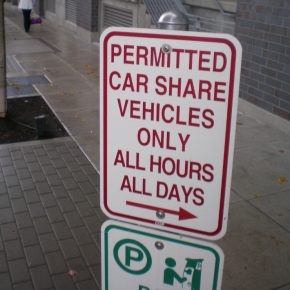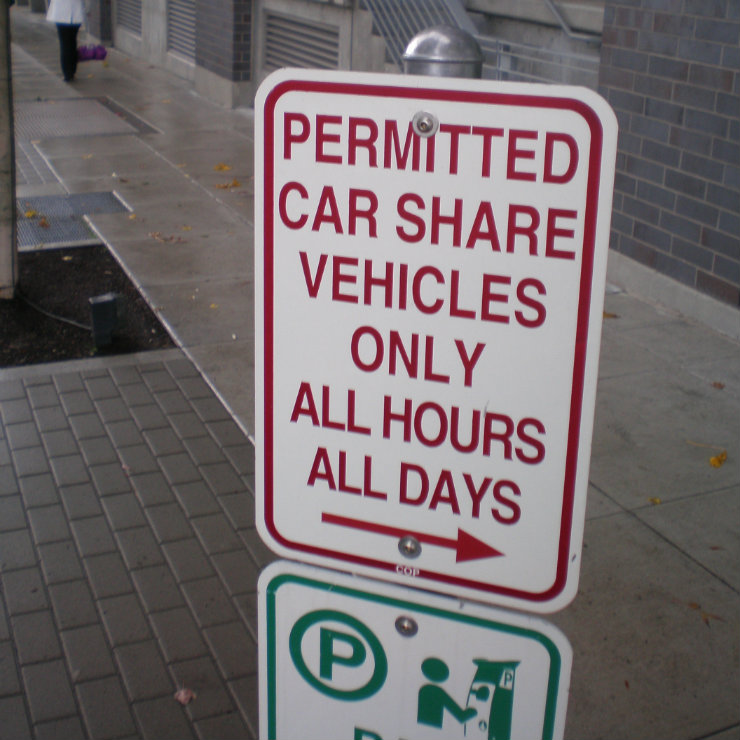Tydzień w gospodarce
Category: Trendy gospodarcze

(Dave Reid, CC BY-NC 2.0)
Car sharing, a transportation service which lets users rent cars for short periods of time, has sprung into existence in order to meet the needs of urban dwellers of the 21st century. Instead of paying hefty annual fees for owning a car, which is most of the time left unused, more and more people are favoring a non-ownership model — they pay only for the time they actually drive the car. The French tech company Vulog identified the up and coming European cities for car sharing.
So far, the service has found most devotees in cities across Russia and Asia. According to a Bloomberg article from February 2019, citing a study by Frost and Sulivan, Tokyo boosts the world’s largest car sharing fleet of nearly 20,000 cars. The Japanese capital is followed by Moscow (16,500), Beijing (15,400), Shanghai (13,900) and Guangzhou (4,200).
The size of a car sharing fleet says far more about a city population than the popularity of the service. Although European-based car sharing companies are not in the position to scale as much as their competitors in Moscow or Tokyo, the service is at least equally popular among Europeans.
According to a Deloitte’s report, car sharing has continuously seen double-digit growth over the last few years. This particularly applies to big cities where people are losing interest in financing a car purchase. Although the idea was born in the United States, it has quickly become a global phenomenon. And Europe now represents over 50 per cent of the global car sharing market with 5,8 million users, according to the study.
“Germany is by far the biggest car sharing market in Europe, where growth has accelerated since 2012 (0,26 million users), and is expected to keep momentum, reaching 3,1 million users by 2020,” the study says.
In their report Vulog identified the European cities with the highest potential for growth in the coming months and years. Vulog uses the following criteria to evaluate the cities’ car sharing potential: city demographics and structure, municipality support and existing mobility offers.
Poland being already the fourth largest car sharing market in Europe, the country’s second biggest city by population (just under 800,000) is projected to become one the major car sharing players in the CSE region.
Despite the city’s relatively large size, Cracow car sharing fleet (400) is still far smaller than the one in the country’s capital of Warsaw (1,600). Besides Cracow being a popular tourist destination (over 10 million annually), the city also boosts young and dynamic demographic who have grown up in the era of shared economy.
“Residents are, therefore, generally eager to try out new mobility solutions, and the city’s infrastructure is very conducive to doing so: the city is actively creating the right conditions thanks to free parking for EV’s, the creation of low emission zones and the implementation of strict access regulations,” the report reads.
The fact that there are currently only three providers on the market, along with the favorable city conditions, makes Cracow one of Europe’s up and coming cities for car sharing.
The Croatian capital is one of the most densely populated (4,316 people per square kilometer) cities in the CSE region. Besides that, tourism in Croatia has soared in recent years, making up to 20 per cent of the country’s GDP with around 19 million tourists annually.
Zagreb is also a member of CIVITAS (a network of cities committed to cleaner transport and sustainable mobility in Europe), and actively invests in cleaner and more efficient transportation solutions. “The city’s official 2020 development strategy regarding the renovation of the city center cites improving traffic systems as a top priority followed by reducing the use of personal passenger cars,” the author of the report write.
Equally important is the federal government support for green initiatives, such as subsidies for private EVs and investing in EV charging infrastructure across the country. While Zagreb is still in early stages of carsharing development, the city has top resources for a carsharing service to be successful. Already in 2012, the city won the European Mobility Week Award.
Despite the country’s high car ownership rate (around 674 cars per 1000 inhabitants), Italy’s car sharing market is already the second strongest in Europe with over one million registered car sharing users.
“There is a strong focus on transforming Torino into a ‘Smart City’ with a high-tech economy. It’s dense transportation network goes hand in hand with car sharing and municipal efforts to provide integrated and competitive urban transport systems,” the authors of the report say.
It’s mainly the city forward-thinking approach that positions Torino to experience a car sharing boom in months and years to come. For example, the city already has parking zones dedicated to car sharing vehicles.
Currently, there are three large services present on the Torino car sharing market. However, according to Vulog report, there is still a plenty of space for other car sharing companies to enter the market. After all, Torino is, with nearly 900,000 inhabitants, the 4th largest metro area in Italy. Moreover, the city’s car sharing rate (673 per 1000 inhabitants) is well above the average in the EU (587).
With population as high as 15 million, Istanbul was rated the second most congested city in the world. In 2018, the city’s drivers spent approximately 157 hours a year in traffic during peak rush hour periods, according to the report. Although the total number of registered vehicles exceeded 22,9 million by the end of 2018, the number of new vehicles registrations in Turkey had fallen by 45,5 percent year-on-year, the report says. “Meanwhile, in order to further alleviate congestion, city officials are actively looking into new forms of transportation and mobility. The pressure today in Istanbul is high and new solutions are in dire need,” the report’s authors add.
The Vulog report compares Istanbul to a pre-car sharing boom Moscow. “In terms of congestion and population size, Istanbul is very similar to Moscow which happens to be one of the top car sharing cities in the world.” The only difference between those two cities is the attitude of the city officials. “Conditions are right in Istanbul and operators need to be ready to launch as soon as the last piece of the puzzle (in this case legislation) gets put into place.”
By developing car sharing services automakers and OEM companies have an opportunity to become more attractive on the market. According to Deloitte “technological advances for future mobility will further underpin importance of car sharing as a new mobility concept. It’s all because car sharing is predestine for the implementation of e-mobility and autonomous driving, and can therefore be a key enabler to significantly increase the acceptance of future mobility concepts among the population.”
Filip Brokeš is an analyst and a journalist specializing in international relations.

